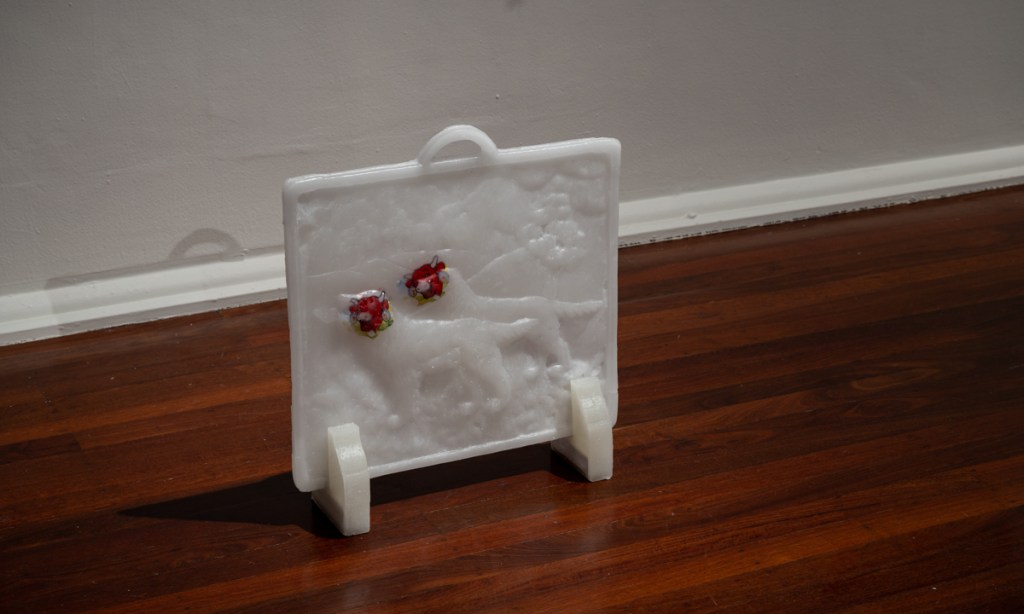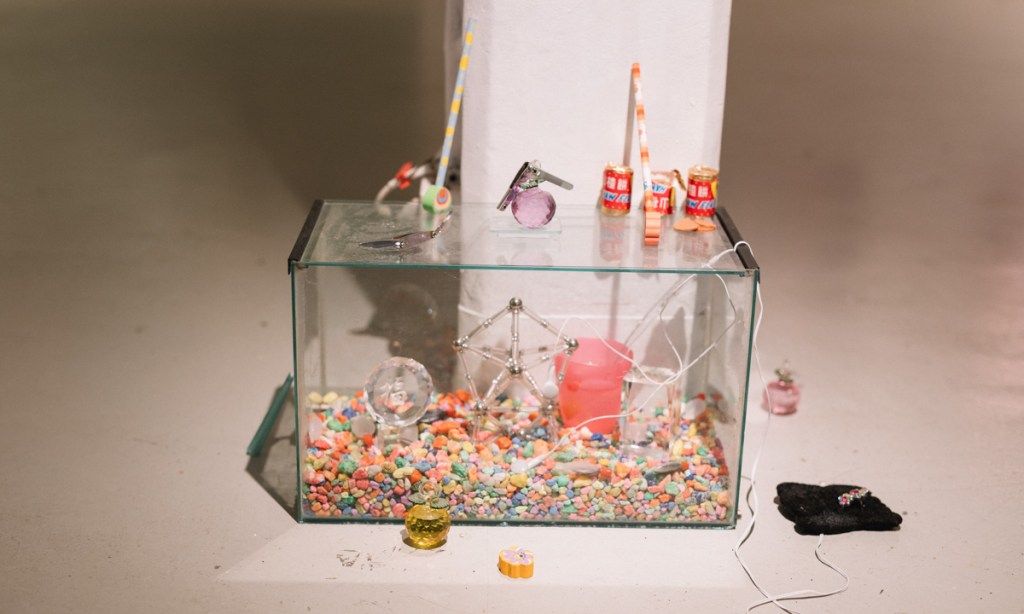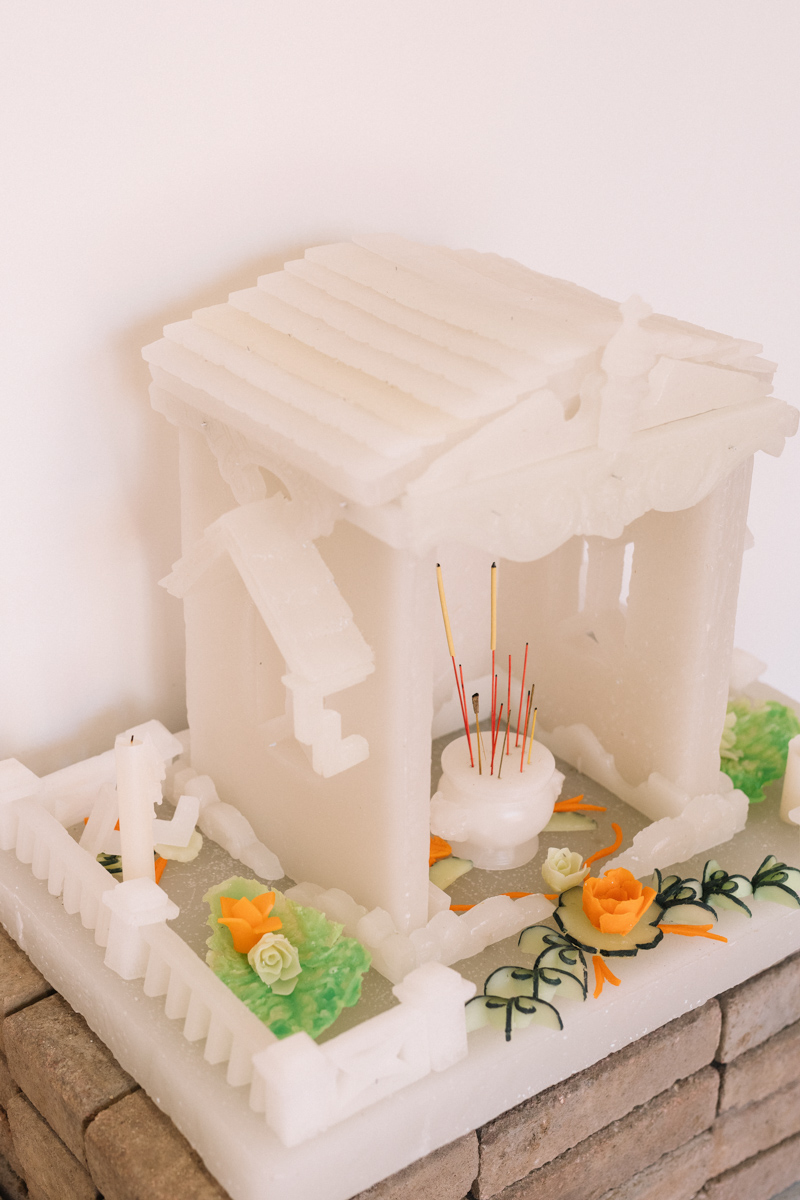Emerging artists Jazmine Deng and Shaye Dương, who feature in the group show 'Pendulum', speak about navigating shifting experiences of home and self through their work.
Lost and found in (mis)translation
Artist Jazmine Deng meets CityMag at Chinatown’s iconic red gate, near the Adelaide Central Markets. The smell of fried garlic mixes with cigarette smoke as we walk to Breadtop to get out of the rain.
At the self-serve bakery, a handful of people with trays mill around. Gluten-rich offerings in neatly arranged displays catch the bright, yellow light.
Pendulum
Until 18 December
Nexus Arts
Lion Arts Centre, North Terrace, Adelaide 5000
More info
The pineapple bun – or bo lo bao in Cantonese – sometimes has custard in it, Jazmine tells us as she places one on a tray. This one turns out to be custardless, but it’s enjoyed nonetheless, crumbs gathering on our table. We’re the only ones sitting in the dimly lit area tucked away behind the counter.
Outside, the rain is being dragged across the bitumen by peak hour traffic.
We’ve met with Jazmine to speak about the work she contributed to Pendulum, an exhibition curated by Jonathan Kim, currently showing at Nexus Arts as part of OzAsia Festival.
A video work that is part of the exhibition shows frying dumplings, which sound like water hitting tiles, before the camera then shows cigarette butts floating in yellowing water, zooming in until they seem surreal.
Jazmine’s work, like the five other second-generation Asian immigrant artists featured in the show, responds to the process of acculturation, assimilating into a culture different from your own. Or, in Jazmine’s words, “like a culture on a culture”.
When asked about her first reaction to the exhibition’s theme, Jazmine says “it feels painful” to think about a culture having to “soften” to fit into “a dominating culture”.
“It just hits me quite a bit,” she says. “I know that there’s a lot of loss I’ve had to face without even me realising it – a lot of sacrifice by my family.
“Something that was really important that was taken away from me, that I will have no idea of at all, is painful.”
‘loving/dying/hating/living (i’ve come to a gradual state of undoing)’, a sculptural installation that includes the video work, seems to reflect this. Text hovers and disappears on the screen like an inner monologue. Everyday objects and cultural symbols are folded into jump cuts and abstract forms.
The floor sheet tells us the backing track heard in parts of the video is Jazmine’s sister playing the piano. “My family is a really massive part of my practice,” Jazmine says.

Shaye Dương’s ‘No Laughing’. This picture: Miles Noel
Shaye Dương, another artist featured in the show and one of the 2022 Adelaide Contemporary Experimental Studio Artist Program recipients, tells CityMag she hadn’t heard of acculturation before this show. The concept reminds her of Homi K. Bhabha’s writing.
“He speaks of culture as an ‘unfixed entity’ – so with this, the notion of cultures being authentic and pure is a myth because they are always in flux,” Shaye says. “I really resonate with this.”
Hanging by the entrance, Shaye’s work, ‘No Laughing’ – a wax cast with the Laughing Cow logo replacing the heads of two dogs – invites us into this shifting landscape.
Shaye is well-acquainted with the popular cheese being used as a bánh mì filling, and has seen the brand’s logo decorating the facades of phở restaurants, but she’s not entirely sure how it made its way into Vietnamese culture.
“Laughing Cow isn’t by any means a Vietnamese brand or food, but the imagery seems to have been adopted in Vietnam,” she says.
“I guess it’s just another example of how images and objects travel, become mistranslated and then adopted into new environments. Acculturation!”
Although Shaye says her work in Pendulum is influenced by her “Vietnamese cultural upbringing”, she doesn’t want to be constrained by “such parameters”.
“I think that audiences, galleries, the institution – blah, blah – find it convenient to place artists in these categories and then call it a day,” she says. “I’m very early in my practice – I only graduated last year from art school and am still grappling with what my practice is actually about.
“I’ve started to accept that aspects of my Vietnamese cultural upbringing are always going to find their way into my work.”

This picture: Thomas McCammon
Jazmine shares similar sentiments. While she has seen other artists explore concepts that don’t relate directly to their identity, she says she can’t “help but be personal” in her work.
At Pendulum’s opening, CityMag recognises a sachet of dehydrated vegetables stuck onto the side of a pillar. It’s part of the seasoning for one of our favourite instant noodle brands. On the floor below is a small glass tank. Unlike the ones from Jazmine’s childhood – which featured a range of pet fish – this one showcases objects you might find lying around someone’s home. Looking closer, CityMag notices plastic soy sauce fish littered through the bed of colourful aquarium rocks.
Across from the entrance to the gallery is a kind of altar. Sitting on a pile of bricks, ‘Faltar’ is a wax sculpture referencing the architectural form of ancestral altars often found in households and shops, Shaye tells us. Surrounding it are candles and other wax decorations, alluding to another Vietnamese archetype – carved vegetables.
“It’s more about my scepticism and disconnect towards this and how I attempt to navigate certain cultural spaces,” Shaye says. “I was thinking about my paradoxical position as both spectator and participant of Vietnamese culture.”
“My works in Pendulum are literal bastardisations of ‘traditional’ Vietnamese objects and practices.”

For Shaye, these “peripheral aspects” of Vietnamese culture are often the “only meaningful source of connection”. But, she says, trying to define “Vietnamese-ness” is subjective, and these cultural tropes could be significant in other ways to someone else.
“Navigating spatial uncertainty, in a broad sense, as well as themes of mistranslation seem to be ideas that keep popping up through my practice,” she says.
Quoting K. Satchidanandan on the experience of second- and third-generation migrants, she adds, “Home is not a place to return, but a place to fantasise about.”
This slippery idea of home also finds its way into Jazmine’s work, which features footage and items from her family’s house, including her mother’s and grandmother’s jewellery. These items are juxtaposed – often in absurd ways – with everyday objects and cultural symbols.
Jazmine, who graduated from the Adelaide Central School of Arts at the end of 2021, says there is a tension between the “‘Oh, it’s so serious’” art, and people who make art and “don’t care about explaining themselves”.
“I dip my toes in both rivers,” Jazmine says. “That’s not a saying,” she clarifies. CityMag thinks it should be.
Jazmine says her art practice pushes “into the edge of humour”. Being “silly” or “stupid” to engage with “emotional turmoil” is her way of dealing with “overbearing” systems that perpetuate oppressive structures, she says.
“I think it’s all a big lie,” she says of society at large. “That’s where the humour in my work comes in: ‘This is all really stupid – just saying’.”
For Jazmine, it doesn’t make sense to come up with a concept before making art.
“Things feel the most pure, or interesting – like I’m getting somewhere – when I’m playing with things that are really immediate,” she says. “When you can’t get it anywhere else but this moment right here – where everything is in my surroundings.”
CityMag first encountered Jazmine through her performance work during her MUD residency in September. At Nexus, she opened Pendulum reading from a notebook, while finding unexpected ways to use a mesh laundry basket as a prop.
“Performance fits really well because it’s a tangible way for me to do something that is incredibly immediate,” she says. “And I’m using my body to do it, which is unknown – like, you can move in lots of unknown ways.
“And it’s working with time as well, where people are forced to stay with me for a while.”
Through her practice, Jazmine says she’s trying to figure out how to show that feelings of pain and hurt, that people might otherwise shy away from, are not always “a bad thing”.
“I’m really interested in just being honest, and the idea of truth,” Jazmine says. “I think that’s a pretty big conversation people have, about not always trying to be happy.”
Pendulum, curated by Jonathan Kim, is showing at Nexus Arts Gallery until 18 November as part of OzAsia Festival. The show also features artists Jake Yang, Alice Hu, ej son and Chris Yee.
Jazmine Deng’s solo show There is so much (.. play, eat, rest, sleep, I can finally see you now) is showing at FELTspace until 3 December.
Shaye Dương’s work will be featured as part of Adelaide Contemporary Experimental’s Studios: 2022, running until 17 December.




